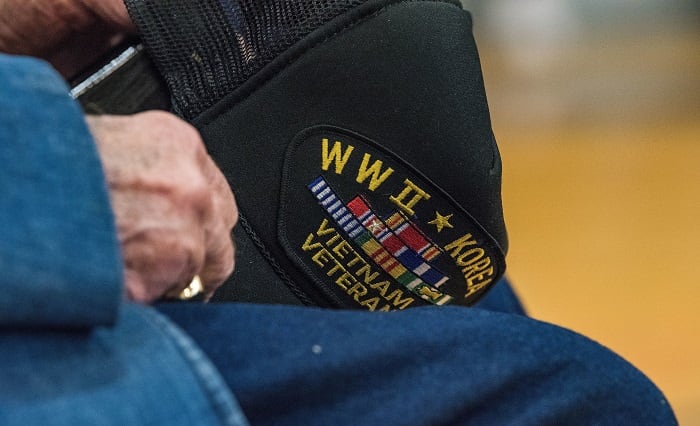House and Senate lawmakers on Tuesday unveiled a bipartisan package of veterans bills which would dramatically expand in-home care for aging veterans, boost assistance for homeless veterans and mandate specific progress points for the department’s electronic health records overhaul.
The measure — expected to cost $1.7 billion over the next 10 years — has the support of key leaders from both chambers and could be passed into law in the next few weeks, provided party leaders can navigate potential congressional roadblocks.
Members of the House and Senate Veterans’ Affairs committees have been working on the proposals behind the scenes since last fall, and praised the legislation as a chance to enact swift, meaningful changes for a host of veterans and family members.
“This bill would expand economic opportunities for veterans, give veterans more choice in where they choose to live out their sunset years or receive health care, improve mental health support for veteran caregivers, hold VA accountable to the taxpayers and veterans they serve, and so much more,” House Veterans’ Affairs Committee Chairman Mike Bost, R-Ill., said in a statement.
“Each of these improvements will make a positive impact on veterans and their families every single day, and I look forward to passing this good bill out of the House soon.”
Similarly, Senate Veterans’ Affairs Committee Chairman Jon Tester, D-Mont., called the measure a collection of “common sense” improvements to help veterans.
The measure already has backing from a host of veterans groups, but House Democrats have yet to announce their stance on the ideas.
More help for caregivers
The legislation — named for former Sen. Elizabeth Dole, who has been a vocal advocate on military caregivers issues for more than a decade — includes 15 separate bills from both Republicans and Democrats already pending in Congress.
The highest profile may be the bipartisan Home Care Act, which would expand access to home-based and community-based services at every VA medical center. Supporters have said that will allow tens of thousands more veterans to receive medical care at home rather than in nursing home institutions, if they choose to do so.
It would increase the cap for in-home care programs from 65% of nursing home costs to 100%, potentially providing thousands of dollars more a month to eligible families. In some cases, that figure could go even higher, if VA officials decide that at-home care is “in the best interest of the veterans.”
The legislation would also require an overhaul of the programs and processes surrounding those at-home care options, and clear up criteria for enrollment in VA’s Program of Comprehensive Assistance for Family Caregivers. And it would create a mental health care grant program for family caregivers in the VA’s current program.
Eligibility for the PCAFC — which includes monthly stipends for family members who act as caregivers for infirm veterans — has been a point of contention in recent years.
The bill also funds several new pilot programs to address shortages of home health aides in some regions and to research the effectiveness of assisted living services for veterans.
Other provisions
The package of bills also includes provisions to boost supportive housing grants by 18%, a move that could provide several thousand dollars more a month to charities providing shelter for homeless veterans.
Advocates have been pushing for that move for years, saying higher inflation and rental costs have cut down on affordable housing options for veterans in financial distress.
Provisions regarding the department’s much-maligned electronic health records overhaul would require VA leaders to “establish a baseline of clinical and operational practices” before moving ahead with the 10-year, $16 billion project, which has been stalled for the last 13 months.
It would also end the program within two years “unless the Secretary has certified that facilities using the Oracle Cerner EHR have recovered and that the health care quality metrics demonstrate improvement in each measurement period since the system became active at each facility.”
Lawmakers have been critical of the program, launched under then-President Donald Trump in 2018 as a way to bring VA and Defense Department health records onto the same software platform. Since then, the effort has been plagued by system shortfalls, employee complaints and delays.
The measure also includes language requiring more outreach and public notification to veterans about community care options, which are private-sector medical appointments paid by VA when wait times within the system reach certain benchmarks.
New rules would limit when VA officials can restrict community care and mandate that department staffers inform veterans of the option when they are receiving information about their benefits.
Final passage
Paying for the package would be done through new fees on VA home loans, an offset that lawmakers say will prevent the legislation from breaking congressional budget rules. But even with that, passing the veterans legislation remains a difficult task.
Both the House and Senate are currently engaged in fiscal 2025 budget work, a process that took six months longer than expected last cycle.
Both chambers are expected to be in Washington, D.C. for most of the next six weeks, but recess for half of July and almost all of August in advance of the fall presidential and congressional elections. Whether that leaves enough time to move the veterans bill among the other pressing business is unclear.
Both Tester and Bost said they hope to move on the issue as soon as possible. Senate Veterans’ Affairs Committee ranking member Jerry Moran, R-Kansas, has also signaled support for the measure.
Leo covers Congress, Veterans Affairs and the White House for Military Times. He has covered Washington, D.C. since 2004, focusing on military personnel and veterans policies. His work has earned numerous honors, including a 2009 Polk award, a 2010 National Headliner Award, the IAVA Leadership in Journalism award and the VFW News Media award.





